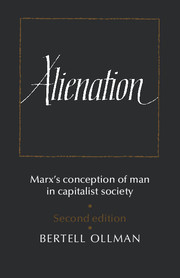Book contents
- Frontmatter
- Contents
- Preface to the second edition
- Note on translations
- Acknowledgements
- General introduction
- PART I PHILOSOPHICAL INTRODUCTION
- PART II MARX'S CONCEPTION OF HUMAN NATURE
- PART III THE THEORY OF ALIENATION
- PART IV CONCLUSION
- 33 A critical evaluation
- Appendix I In defense of the philosophy of internal relations
- Appendix II Response to my critics: more on internal relations
- Notes to the text
- Bibliography of works cited
- Index of names and ideas
- Cambridge Studies in the History and Theory of Politics
33 - A critical evaluation
Published online by Cambridge University Press: 05 June 2012
- Frontmatter
- Contents
- Preface to the second edition
- Note on translations
- Acknowledgements
- General introduction
- PART I PHILOSOPHICAL INTRODUCTION
- PART II MARX'S CONCEPTION OF HUMAN NATURE
- PART III THE THEORY OF ALIENATION
- PART IV CONCLUSION
- 33 A critical evaluation
- Appendix I In defense of the philosophy of internal relations
- Appendix II Response to my critics: more on internal relations
- Notes to the text
- Bibliography of works cited
- Index of names and ideas
- Cambridge Studies in the History and Theory of Politics
Summary
Marxism, as it emerges from this study, is like a magnificently rich tapestry with a multitude of colors and patterns superimposed on one another. To see them all we must begin by seeing them singly, to grasp one and then start on the outlines of another and so on, until every pattern is grasped along with the interconnections between them, as these interconnections too are part of the overall design. Yet, even as our attention is directed to the first pattern, we cannot help noticing sections of others, for each piece functions in more than one. Marx's theories are not interrelated, as this is ordinarily understood, but rather include one another. Thus, no matter with which one we begin, to draw out all its relations is to present Marxism, though it is the whole observed from a particular angle and expressed in a one-sided way.
The necessary distortion of Marxism introduced by this account of the theory of alienation can only be righted by equally detailed accounts of the same material as part of other major theories, and of the materialist conception of history in particular. Only then would Marxism be revealed with anything like the thoroughness with which Marx sought to reveal society. The chief justification for my own one-sided study lies in its dealing with the side that has received least serious attention.
- Type
- Chapter
- Information
- AlienationMarx's Conception of Man in a Capitalist Society, pp. 237 - 255Publisher: Cambridge University PressPrint publication year: 1977

